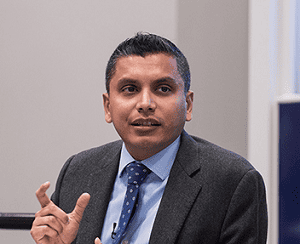Recent audit failures are bringing new scrutiny to the dominance and business practices of the Big Four accounting firms.

Strong words, and more, are being hurled at the global accounting establishment these days. A recent UK House of Commons report on the collapse of sprawling construction contractor Carillion derided auditing’s Big Four—Deloitte, Ernst & Young, KPMG and PricewaterhouseCoopers—as a “cozy club incapable of providing the degree of independent challenge needed.” Carillion went into liquidation owing creditors £1.5 billion ($1.9 billion), despite its accounts having been cleared by Deloitte as internal auditor and KPMG as external auditor.
In the US, a surprise $15 billion charge related to General Electric’s insurance business prompted 35% of shareholders to vote against retaining KPMG, its auditor for more than a century.
That came a few months after six KPMG partners were indicted for eliciting confidential information about pending inspections from the industry regulator, the Public Company Accounting Oversight Board, and the Federal Deposit Insurance Corporation won a federal lawsuit against PwC for its failure to detect $2.3 billion worth of fraud at an Alabama-based bank that later failed. PwC faces hundreds of millions of dollars in damages.
Elsewhere around the world: KPMG faces potential criminal charges in South Africa over its long-running relationship with the Gupta family, who are close to former President Jacob Zuma. Ukraine’s largest bank, PrivatBank, is suing PwC for $3 billion, accusing the firm of turning a blind eye to massive loans—secured with questionable collateral or outright fraudulent—doled out to the institution’s former private owners. And so on. “It feels like we’ve had scandal after scandal, and auditors rarely seem to be held to account,” says Natasha Landell-Mills, head of stewardship at London-based asset manager Sarasin & Partners.

Landell-Mills, Sarasin & Partners: Scandal after scandaland auditors rarely held to account. |
Challenges of Reform
Railing against the accounting status quo is a lot easier than usefully reforming it. Informed governance advocates see the most knee-jerk suggestion arising from the Carillion debacle, “breaking up” the Big Four, as impractical and likely unwise. “The issue is not the number of accounting firms,” says Paolo Quattrone, professor of accounting, governance and social innovation at the University of Edinburgh. “The issue is creating some tension and conversation among stakeholders.”
But this should not lull corporate-finance officers and their auditors into the complacent conclusion that the current furor will just blow over. Regulators and investors, the sleeping giants of corporate financial oversight, are increasingly clamoring for audit reports that go beyond the classic “pass/fail” to detailed analysis of how various risks and intricacies are accounted for. They have the tools at hand in the “extended audit reports” that are already required (sort of) in the UK and European Union and will be phased in over the next few years in the US.
Outside stakeholders may start paying closer attention to the widespread phenomenon of auditors performing consulting services for auditees, though an outright ban on this lucrative practice looks unlikely for the moment. Companies can expect a push for stricter term limits on an auditor’s tenure, or at least competitive bids periodically. Anything like the 109-year run of KPMG and its predecessor organizations at GE looks set to become a red flag, if not a relic. “We’re hoping GE is kind of a wake-up call on audit issues,” says Jeff Mahoney, general counsel for the Council of Institutional Investors in Washington. “I don’t think companies will be able to stand pat and do nothing.”
The flaws of the current accounting order as a guardian of transparent global capitalism are obvious, if not glaring. The firms make far less money from audits than consulting. That undermines, to say the least, the ideal of an independent auditor shining a light on management’s bookkeeping in the interests of shareholders and the broader society. “When you’re an audit partner, you’re really not going to push back on the client,” says Christian Wolfe, pseudonym for an accountant in New York who contributes to the internal dissident website Big4accountingfirms.com. “In case you do push back, they’ll go over your head and find somebody who won’t.”
Substituting one Big Four firm for another is unlikely to change this dynamic. “Auditing is effectively a captured market with a commodity product,” says Karthik Ramanna, a professor of business and public policy at Oxford’s Blavatnik School of Government who focuses on the subject. “The market conditions are such that they yield mediocrity.”
Globally, the Big Four work through franchising or minority joint ventures. So an office in South Africa, Ukraine or China bears the prestigious name, while the home-office partners are insulated from liability for its work. In all markets, “bean counters” who start with the Big Four percolate through the ranks of the CFOs they serve and the regulators who monitor them, forming an old-boys-and-girls club instinctively resistant to outside tinkering. “Audit firms have the most incredibly extensive alumni network in industry and government,” Landell-Mills says. “It becomes quite incestuous and concerning.”
But how to move toward audits that are more disinterested and effective, from a client’s or broader societal point of view, is far less obvious. Looking beyond the Big Four for a smaller, more audit-focused player is a nonstarter under current market conditions. Virtually every company listed on a major stock exchange uses the established players, and for good reason. Tarnished as the Big Four might be, a non-Big Four auditor is a red flag likely to attract short sellers, says Wuyang Zhao, a professor at the University of Texas at Austin, who has researched this area.
Disentangling auditing from consulting work is a more promising avenue for reform, though also far from clear-cut. In theory, a solid “Chinese wall” between the two would lead to audits that are more at arm’s length and are not an excuse to sell better-paying consulting contracts. “If I’m giving private tutoring to the same students I am evaluating, that’s an obvious conflict of interest,” Ramanna notes. The conflict has become more dramatic as Big Four consulting revenue has jumped 44% globally since 2012 compared to a 3% rise in audit fees.
But practically speaking, an auditor already steeped in the complexities of a client organization may provide better and cheaper advice on, say, IT system improvements or potential synergies with an acquisition target. The Big Four also use the promise of a future in consulting to keep junior auditors’ noses to the grindstone, insider Wolfe says. “If you turn the firms into audit-only, the quality will be even worse, because you won’t get the talent in there,” he says.

Karthik Rammana: Auditing is effectively a captured market. |
Regulators Bulk Up
The US is ahead of global peers in limiting audit-consulting crossover, thanks to the 2002 Sarbanes-Oxley law, which was passed in response to a number of accounting scandals, including the massive Enron and WorldCom accounting frauds. The profession has found enough loopholes in the years since that auditors add an average 25% onto their fees with nonaudit work. The comparable number for the UK is around 50%, while the EU allows up to 70% for nonaudit add-ons.
Regulators in these and other jurisdictions may well move in the direction of US standards, particularly the UK, where the trauma of the Carillion scandal coincides with a broader debate on how to remain a “financial-services superpower” once the country leaves the EU. “The UK, post-Brexit, is going through an almost existential review on the nature of its economy, which amplifies the political will around looking at audit,” Ramanna says.
One lesson for management everywhere from the GE dustup is that a sharp rise in fees to the auditor may provoke otherwise pliant investors to look under the hood. KPMG’s earnings from its star client jumped by 59% to $ 142.9 million in the year it missed the $15 billion hole in the insurance division. The accounting firm had a good explanation: It was running the numbers on GE’s acquisition of oilfield-services provider Baker Hughes. But the number stirred shareholders’ wrath nonetheless.
As KPMG’s century-plus tenure at GE indicates, the US is the global laggard on term limits for corporate auditors. (The House of Representatives passed a bill in 2013 prohibiting such regulation.) The UK and EU both require a competitive tender for the audit role every 10 years, with mandatory rotation after 20, and activist investors would like to push US companies in that direction.
The most practical path toward better accounting in the short term is likely through using extended audit statements, which is more an opportunity than a requirement for audited companies. It empowers them to identify “key audit matters” (or “critical audit matters” in the US) of their own choosing—say, environmental risk or valuation of an acquisition target—and offers a “description of the audit approach” in relation to them.
If that sounds a little vague, it is. UK extended audit, launched in 2013, has succeeded in “start[ing] a conversation between the users and producers of corporate financial information,” finds a recent report by the Institute for Chartered Accountants in England and Wales. But “the whole system needs support and encouragement to avoid boilerplate and enhance quality.”
Still, the ICAEW research yields useful clues on where the low-hanging fruit and clearest impediments are on the path beyond pass/fail corporate auditing. Large companies surveyed in the UK flagged an average of two to four key audit matters on their financial reports. The most common key matter, not surprisingly, was the quality of revenue. But No. 2 was valuing goodwill and No. 4 was accounting for acquisitions, indicating a brighter light set to shine on a corner of bookkeeping that can owe as much to art as science.
A principal obstacle to fuller disclosure was raised by Marks and Spencer, the British retailer consistently seen as a paragon of corporate governance. The company won an Investment Association award for the FTSE 100’s best audit report of 2015. But it had to think carefully about which bits of its financial soul to bare in a competitive and litigious environment, engagement partner Ian Waller told ICAEW. “The key challenge was striking the right balance between giving more color in the audit report and potentially disclosing more information than was disclosed by management in the annual report,” he said.
Oxford’s Ramanna puts this dilemma more bluntly. “Few companies have disclosed more than they are required to,” he says. “The more you say, the more likely you are to be sued.” He has a simple proposal for squeezing more qualitative information out of auditors. He would require them to issue a grade—A through F on the US scale—on each of the 10 most-significant accounting judgments of a client company’s financial report, e.g., issues like accounting policies on goodwill, allowances for doubtful receivables and so on. “If we’re not able to address the structural issues with the auditing oligopoly, this would at least provide more texture and nuance to the auditor report,” Ramanna says.
But reform on this scale would require concentrated and sustained support from investors, the only constituency that could provide a political counterweight to the corporate Big Four nexus. Sarasin’s Landell-Mills holds out little hope of this happening anytime soon. Governance watchdogs have so far trained their fire on more emotionally evocative issues like executive pay or environmental impact, leaving required shareholder approval of the corporate auditor as a reliable annual-meeting ‘yes’ vote. “What you see is Kazakhstani-type election results,” she says. “Auditors are almost always approved with at least 97% of the vote. The problem is that audit is perceived as boring, and investors just rubber-stamp their appointment. Too few seem to care about this vital shareholder protection.”
Mahoney, from the Council of Institutional Investors, is more optimistic. The GE debacle has galvanized more shareholders around the council’s recommendation that companies tender their audit contract every five years, ban nonaudit consulting work and make maximum use of the forthcoming expanded audit statement.
Meanwhile, Mahoney’s advice to CFOs is to encourage transparency and dissenting opinions internally, rather than leaving any murky accounting corners for the auditors or marketplace to fumigate. “You have to create an environment where employees are willing to raise an issue they’ve discovered with their superiors,” he says. “Take whistleblowers seriously, and be very serious about investigating their claims.” Or you could take a chance on becoming the next Carillion or GE.



